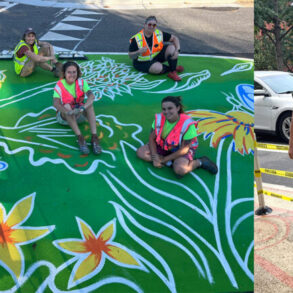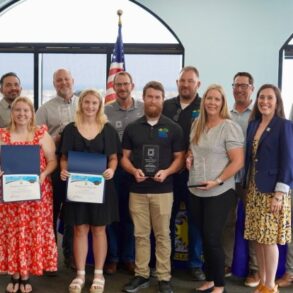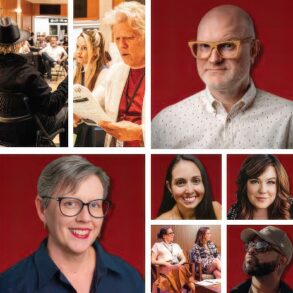Nancy Stamm tries not to paint when her gallery door is unlocked.
That way the Carlisle artist can welcome customers and take care of business at her North Hanover Street space without distraction. Any other time, though, is fair game.
“I paint when I get home,” she said. “If I have two little projects I’d [like to] get done before dinner, I’m going to do them. I … paint in the morning … and then weekends and Sundays, I hurry around to get all my housework done so I can go paint, or go take photos of things I want to paint.”
She was born with a passion for painting, one that led to the opening of Nancy Stamm’s Galleria in Carlisle about 30 years ago.
Stamm’s is one of several arts businesses that line the streets of downtown Carlisle and October, National Arts and Humanities Month, gives them time to shine a little brighter.
People are also reading…

Nancy Stamm’s Galleria is at 2 N. Hanover St. in Carlisle.
Hobby versus career
After 36 years of business, JW Music founder and owner Justin Walters has come to understand that many see music and the arts as a hobby.
“It’s something they do for fun or enjoyment,” he said.
A hobby for some, others make a career in the arts industry. In fact, it’s a balance Walters once had to find.
He grew up playing the violin and opened his business in 1988, just after graduating college. Shortly thereafter, he was accepted into medical school in Philadelphia.

Walters
“I went there and started rotations and it was like, ‘Man, I’m just tired and burned out,’ and I came back and I started playing violin again,” Walters said.
After three years of medical school, he decided to stick with his music business full time.
Today, JW Music rents band and orchestra instruments to local school districts and sells guitars, pianos, ukuleles and other instruments. The business also repairs and services instruments and offers lessons.
“It’s kind of like a one-stop shop,” he said.

Pet portraits fill a wall at Nancy Stamm’s Galleria along North Hanover Street in Carlisle.
For Stamm, running a business is what allows her to support her “art habit.”
Her gallery features walls covered in paintings of all sizes, along with work from other artists she’s met through her travels, from jewelry to pottery. To Stamm, the art business is like any other, with sales taxes, licenses and paperwork.
“I don’t mind the business side because it’s a trade off to have an art business,” she said. “But I know some artists don’t ever wish [to] and never will do that. It just takes away from the creative side for them.”

The floor of the Penny Gallery in The Pond building along Pomfret Street in Carlisle is composed of about 140,000 pennies.
Pat Craig owns the Pond, a studio space that includes the Penny Gallery along Pomfret Street in Carlisle. Local artists can rent studio space and the gallery, named for its floor composed of pennies, features rotating exhibits, often coinciding with events like the Ice Art Fest or Pride Week.
Like Walters, she recognizes that many use the humanities to relax, from playing music to sketching to writing poetry. However, artists that make a career out of their work have to learn how to make money from it, she said.
“It does become a job,” she said. “It’s not the fun thing that you had been doing to relax or whatever. Now it actually is a job and you kind of have to think about it like that, whether or not you fall out of love with it as a job … that is the catch-22.”

Craig
After three decades of business, Stamm hasn’t fallen out of love.
“I never understood why people say they burned out,” she said. “I think what they really mean to say is they lost interest, because their objective wasn’t the same as mine. Mine is a passion for just painting. … I think a lot of artists want a financial reward for their skills and talents and most of the ones who burned out will say, ‘Well, nobody will buy it, nobody appreciates it.’ That’s not why artists do it. We do it for us.”
Business challenges
Those who take art beyond a hobby are met with a number of challenges in the humanities industry.
Walters highlighted the economy.
“When the economy is strong, people are buying high-end instruments and they’re getting a lot of instruments for their kids,” he said. “If the economy’s tough and things are tight … money is more tight.”
Over time, Walters has learned to ride the spending waves, saying even when money is tight, people tend to want the best for their kids, and are often still willing to pay for lessons or instrument rentals in the name of learning.
The key: quality instruments, quality service and affordable prices.
“If you keep your prices in line, and in check, and you have a sense of what’s going on in the business world or the community, then you know how to gauge that and help out in that respect,” he said.

Artist Nancy Stamm works on a painting of a dog at her studio along North Hanover Street in Carlisle.
Stamm, too, adapted to the flow of inconsistency throughout her business. She said foot traffic through her gallery is often determined by which businesses are in the area at the time; it changes as shops and restaurants open and close.
Business can also depend on the weather and changing tastes and trends.
With Carlisle being a “crossroads,” Stamm is always sure to see new faces, or repeat customers coming back to make a purchase they might have been contemplating for a while.
Her key to success: diversity. For her business, this means offering custom framing and restoration services in addition to her pet and nature paintings.
To Craig, it means expanding the market outside the Carlisle area.
“I think you have to be willing to be knowledgeable about who your potential clients might be [and] where they might come from, whether they’re walk-ins or you’re going and doing shows somewhere else or you’re doing online entries into other exhibits, things that give you, as an artist, a greater reach than your own backyard,” she said.
Community growth
Stamm’s appreciation for art goes beyond her gallery doors.
“I think people think of art just as galleries, but it’s actually in everything in the downtown that’s typical art how it filtrates out … it gets into everything from the hanging flower baskets to the design and nature of the buildings to the actual layout of the streets … all those things lend a beauty to the town that people can enjoy.”
Walters said the same goes for music, which offers meaningful contributions to weddings, events or parties.
In his 36 years, he’s seen a lot of support from Carlisle and the surrounding area.
Craig believes the arts foster community growth as a whole.
“I think art benefits all communities,” she said. “If you look at the communities across the country, across the world, that grow and thrive, people come out on the streets. People have an interest to be sharing times with each other. It’s usually because it’s postcard pretty.”
This extends into areas like lighting and an overall sense of safety that give people the desire to walk around, Craig said.

Kirsten Olson, left, runs a pottery studio on the first floor of the Pond in Carlisle. Owned by Pat Craig, right, the business rents out studio and gallery space.
Kirsten Olson, who has operated her pottery studio, K. Olson Ceramics on the first floor of the Pond for about seven years, loves the conversations that can begin around her pieces.
“I like to create things that people can use that become a part of their daily life, their daily rituals,” she said. “They have conversations around the thing, which then might create more conversations about other things. So I think there’s something really powerful about creating these connections.”
Craig opened the Pond around 2018 and has owned Pat Craig Studios next door since 2004. In those 20 years, she’s watched Carlisle embrace local arts.
To Olson, this is evident in the new breweries, art centers and other creative places popping up around town. In fact, it was the abundance of galleries that brought her to the borough in the first place.
“I feel like the arts, [are] happening here in Carlisle,” she said. “It’s exciting to see.”
Researchers at the University of Turku in Finland have now reported that viewing certain imagery can have an interesting impact on emotions.
Photos: 42nd Annual Harvest of the Arts Festival

The 42nd annual Harvest of the Arts, presented by the Downtown Carlisle Association and sponsored by M&T Bank, took place on Saturday. Historic Downtown Carlisle’s streets hosted a wide array of visual art, crafts, live music, shopping and dining experiences.

The 42nd annual Harvest of the Arts, presented by the Downtown Carlisle Association and sponsored by M&T Bank, took place on Saturday, Sept. 28, 2024. Historic Downtown Carlisle’s streets hosted a wide array of visual art, crafts, live music, shopping and dining experiences.

The 42nd annual Harvest of the Arts, presented by the Downtown Carlisle Association and sponsored by M&T Bank, took place on Saturday, Sept. 28, 2024. Historic Downtown Carlisle’s streets hosted a wide array of visual art, crafts, live music, shopping and dining experiences.

The 42nd annual Harvest of the Arts, presented by the Downtown Carlisle Association and sponsored by M&T Bank, took place on Saturday, Sept. 28, 2024. Historic Downtown Carlisle’s streets hosted a wide array of visual art, crafts, live music, shopping and dining experiences.

The 42nd annual Harvest of the Arts, presented by the Downtown Carlisle Association and sponsored by M&T Bank, took place on Saturday. Historic Downtown Carlisle’s streets hosted a wide array of visual art, crafts, live music, shopping and dining experiences.

The 42nd annual Harvest of the Arts, presented by the Downtown Carlisle Association and sponsored by M&T Bank, took place on Saturday, Sept. 28, 2024. Historic Downtown Carlisle’s streets hosted a wide array of visual art, crafts, live music, shopping and dining experiences.

The 42nd annual Harvest of the Arts, presented by the Downtown Carlisle Association and sponsored by M&T Bank, took place on Saturday, Sept. 28, 2024. Historic Downtown Carlisle’s streets hosted a wide array of visual art, crafts, live music, shopping and dining experiences.

The 42nd annual Harvest of the Arts, presented by the Downtown Carlisle Association and sponsored by M&T Bank, took place on Saturday, Sept. 28, 2024. Historic Downtown Carlisle’s streets hosted a wide array of visual art, crafts, live music, shopping and dining experiences.

The 42nd annual Harvest of the Arts, presented by the Downtown Carlisle Association and sponsored by M&T Bank, took place on Saturday, Sept. 28, 2024. Historic Downtown Carlisle’s streets hosted a wide array of visual art, crafts, live music, shopping and dining experiences.

The 42nd annual Harvest of the Arts, presented by the Downtown Carlisle Association and sponsored by M&T Bank, took place on Saturday. Historic Downtown Carlisle’s streets hosted a wide array of visual art, crafts, live music, shopping and dining experiences.

The 42nd annual Harvest of the Arts, presented by the Downtown Carlisle Association and sponsored by M&T Bank, took place on Saturday, Sept. 28, 2024. Historic Downtown Carlisle’s streets hosted a wide array of visual art, crafts, live music, shopping and dining experiences.

The 42nd annual Harvest of the Arts, presented by the Downtown Carlisle Association and sponsored by M&T Bank, took place on Saturday, Sept. 28, 2024. Historic Downtown Carlisle’s streets hosted a wide array of visual art, crafts, live music, shopping and dining experiences.

The 42nd annual Harvest of the Arts, presented by the Downtown Carlisle Association and sponsored by M&T Bank, took place on Saturday. Historic Downtown Carlisle’s streets hosted a wide array of visual art, crafts, live music, shopping and dining experiences.

The 42nd annual Harvest of the Arts, presented by the Downtown Carlisle Association and sponsored by M&T Bank, took place on Saturday. Historic Downtown Carlisle’s streets hosted a wide array of visual art, crafts, live music, shopping and dining experiences.

The 42nd annual Harvest of the Arts, presented by the Downtown Carlisle Association and sponsored by M&T Bank, took place on Saturday. Historic Downtown Carlisle’s streets hosted a wide array of visual art, crafts, live music, shopping and dining experiences.

The 42nd annual Harvest of the Arts, presented by the Downtown Carlisle Association and sponsored by M&T Bank, took place on Saturday, Sept. 28, 2024. Historic Downtown Carlisle’s streets hosted a wide array of visual art, crafts, live music, shopping and dining experiences.

The 42nd annual Harvest of the Arts, presented by the Downtown Carlisle Association and sponsored by M&T Bank, took place on Saturday, Sept. 28, 2024. Historic Downtown Carlisle’s streets hosted a wide array of visual art, crafts, live music, shopping and dining experiences.

The 42nd annual Harvest of the Arts, presented by the Downtown Carlisle Association and sponsored by M&T Bank, took place on Saturday, Sept. 28, 2024. Historic Downtown Carlisle’s streets hosted a wide array of visual art, crafts, live music, shopping and dining experiences.

The 42nd annual Harvest of the Arts, presented by the Downtown Carlisle Association and sponsored by M&T Bank, took place on Saturday, Sept. 28, 2024. Historic Downtown Carlisle’s streets hosted a wide array of visual art, crafts, live music, shopping and dining experiences.

The 42nd annual Harvest of the Arts, presented by the Downtown Carlisle Association and sponsored by M&T Bank, took place on Saturday, Sept. 28, 2024. Historic Downtown Carlisle’s streets hosted a wide array of visual art, crafts, live music, shopping and dining experiences.

The 42nd annual Harvest of the Arts, presented by the Downtown Carlisle Association and sponsored by M&T Bank, took place on Saturday, Sept. 28, 2024. Historic Downtown Carlisle’s streets hosted a wide array of visual art, crafts, live music, shopping and dining experiences.

The 42nd annual Harvest of the Arts, presented by the Downtown Carlisle Association and sponsored by M&T Bank, took place on Saturday, Sept. 28, 2024. Historic Downtown Carlisle’s streets hosted a wide array of visual art, crafts, live music, shopping and dining experiences.

The 42nd annual Harvest of the Arts, presented by the Downtown Carlisle Association and sponsored by M&T Bank, took place on Saturday. Historic Downtown Carlisle’s streets hosted a wide array of visual art, crafts, live music, shopping and dining experiences.

The 42nd annual Harvest of the Arts, presented by the Downtown Carlisle Association and sponsored by M&T Bank, took place on Saturday, Sept. 28, 2024. Historic Downtown Carlisle’s streets hosted a wide array of visual art, crafts, live music, shopping and dining experiences.

The 42nd annual Harvest of the Arts, presented by the Downtown Carlisle Association and sponsored by M&T Bank, took place on Saturday, Sept. 28, 2024. Historic Downtown Carlisle’s streets hosted a wide array of visual art, crafts, live music, shopping and dining experiences.

The 42nd annual Harvest of the Arts, presented by the Downtown Carlisle Association and sponsored by M&T Bank, took place on Saturday, Sept. 28, 2024. Historic Downtown Carlisle’s streets hosted a wide array of visual art, crafts, live music, shopping and dining experiences.

The 42nd annual Harvest of the Arts, presented by the Downtown Carlisle Association and sponsored by M&T Bank, took place on Saturday, Sept. 28, 2024. Historic Downtown Carlisle’s streets hosted a wide array of visual art, crafts, live music, shopping and dining experiences.

The 42nd annual Harvest of the Arts, presented by the Downtown Carlisle Association and sponsored by M&T Bank, took place on Saturday, Sept. 28, 2024. Historic Downtown Carlisle’s streets hosted a wide array of visual art, crafts, live music, shopping and dining experiences.

The 42nd annual Harvest of the Arts, presented by the Downtown Carlisle Association and sponsored by M&T Bank, took place on Saturday. Historic Downtown Carlisle’s streets hosted a wide array of visual art, crafts, live music, shopping and dining experiences.

The 42nd annual Harvest of the Arts, presented by the Downtown Carlisle Association and sponsored by M&T Bank, took place on Saturday. Historic Downtown Carlisle’s streets hosted a wide array of visual art, crafts, live music, shopping and dining experiences.

The 42nd annual Harvest of the Arts, presented by the Downtown Carlisle Association and sponsored by M&T Bank, took place on Saturday. Historic Downtown Carlisle’s streets hosted a wide array of visual art, crafts, live music, shopping and dining experiences.

The 42nd annual Harvest of the Arts, presented by the Downtown Carlisle Association and sponsored by M&T Bank, took place on Saturday, Sept. 28, 2024. Historic Downtown Carlisle’s streets hosted a wide array of visual art, crafts, live music, shopping and dining experiences.

The 42nd annual Harvest of the Arts, presented by the Downtown Carlisle Association and sponsored by M&T Bank, took place on Saturday. Historic Downtown Carlisle’s streets hosted a wide array of visual art, crafts, live music, shopping and dining experiences.
Maddie Seiler is a news reporter for The Sentinel and cumberlink.com covering Carlisle and Newville. You can contact her at mseiler@cumberlink.com and follow her on Twitter at: @byMaddieSei
This post was originally published on this site be sure to check out more of their content






